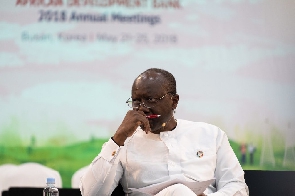 Finance Minister Ken Ofori-Atta
Finance Minister Ken Ofori-Atta
The Domestic Debt Exchange Programme (DDEP), as announced by the Ministry of Finance, includes several types of investors that invested in Government of Ghana (GOG) securities, one of which hasn’t received the needed advocacy is mutual fund clients. It must be noted that very little has been said about the impact on mutual funds and their shareholders since the DDEP debate began.
However, this group contains about 700,000 individual investors who are most likely to be middle-income to low-income earners who can only afford to aggregate investments over a longer period instead of one large investment.
To begin, a mutual fund is a type of financial vehicle that pools the assets of its shareholders and invests them in securities such as stocks, bonds, money market instruments, and other assets. They are public companies established by law and regulated by the Securities and Exchange Commission (SEC) for the purpose of holding and managing securities or other financial assets. According to the SEC 2020 report highlight, there are 31 mutual funds registered with the regulator, some of which include; MFund, Christian Community Mutual Fund, SEM Income Fund, EDC Balanced Fund, and many others.
Business nature of mutual funds
The primary activity of a Mutual Fund is to invest the funds of its members for their mutual benefit by the provisions of the Companies Act, 2019 (Act 992), the Securities Industry Act, 2016 (Act 929), and the Unit Trusts and Mutual Funds Regulations, 2001. (L.I. 1695). The 2020 SEC report states that the 31 mutual funds in operation had a Net Asset Value of GHC 892,970,484.99 and a total Asset under Management (AUM) of GHC 30,584,110,227.64.
What kind of investment portfolios do mutual funds invest in?
Many mutual funds in Ghana are fixed-income in nature, so the majority of funds collected are invested in fixed-income securities such as Government of Ghana bonds and notes. It is mandatory for fixed-income funds to invest a certain portion of their funds in GOG securities, and because sovereign debt is supposed to be default risk-free, it made sense for fund managers to invest in it, especially also at the back of the banking sector clean up, where fund managers lost money in investment and finance houses.
Will clients of mutual funds have their investment impacted?
The Debt Exchange Programme will have an impact on over 700,000 mutual fund clients. Many of these mutual fund clients are low-income earners, such as trotro drivers, market women, farmers, hawkers, mobile money vendors, retail shop owners, students, and food vendors, to name a few. Other groups that invest in mutual funds include retirees, and middle-class individuals.
These clients will be unable to access their investments once the DDEP is implemented because their Fund Managers have invested a significant portion of their funds in GOG securities. It should be noted that the new DDEP terms revealed that, bonds maturing in 2023 will receive 0%, along with a reduction in interest rates and returns that will be unable to keep up with inflation if things continue as they are, mutual fund clients' investments will lose economic value.
Way Forward
The Mutual Funds Boards and Fund Managers should renegotiate with the government to remove mutual fund clients from the DDE. They should be more concerned about a large number of livelihoods that will be lost if the programme is implemented. The clients should persuade their Fund Managers to reject the terms of the DDE.
Also, mutual fund clients should form a coalition to fight for their interests independently.
eowusu.policyanalyst@gmail.com